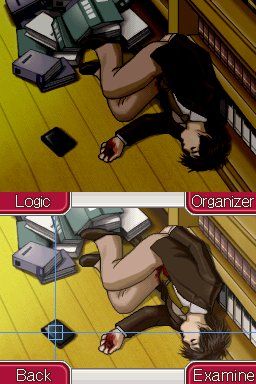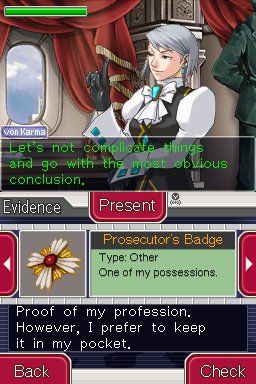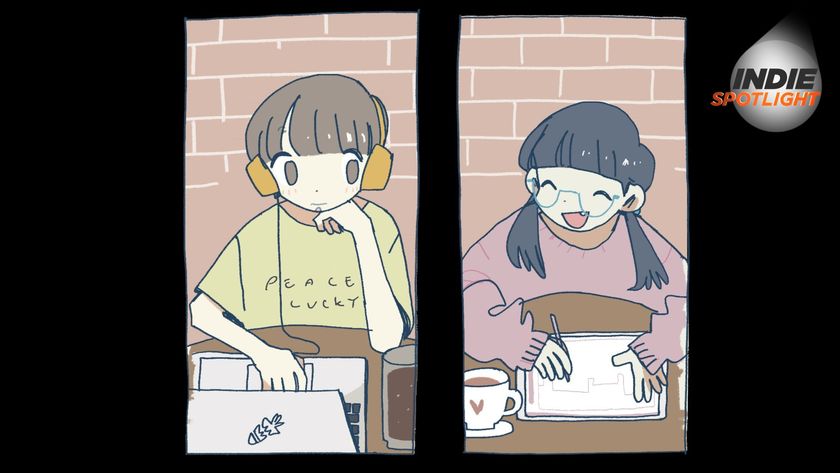Ace Attorney Investigations: Miles Edgeworth Q&A
We put producer Motohide Eshiro on trial
After a string of quirky, well written Ace Attorney games, Capcom is throwing gamers a curveball with Ace Attorney Investigations: Miles Edgeworth. The game introduces new gameplay elements and third-person views, and most notably focuses on fan favorite Miles Edgeworth instead of series staple Phoenix Wright. We put the game’s producer, Motohide Eshiro in the hot seat and grilled him for evidence.

GamesRadar: Ace Attorney Investigations is focused far more on Miles Edgeworth than Phoenix Wright. Do you think players will players have a harder time sympathizing with the more arrogant Edgeworth as opposed to the happy-go-lucky Wright or Apollo?
Motohide Eshiro: We feel with the previous installments players could identify with Phoenix and Apollo, but with Ace Investigations we want players to be immersed in the game, to feel like they actually are Edgeworth. Between being able to directly control Edgeworth at the crime scene and being able to see inside his head with the Logic mode we think that players will really be able to feel a connection with Edgeworth and understand his character.
GR: Why did you decide to use Edgeworth instead of Ema Skye for Ace Investigations?
ME: The original idea behind using Ema as the main character was because the director, Mr. Yamazaki, had the idea to make a game about investigating crime scenes and deductive reasoning. We have this character Ema, whose character actually wants to become a forensic scientist, so it would make sense to use her. But when I mentioned that among the fans, one of the most popular characters is actually Edgeworth, that’s when they changed their mind and decided to go with him instead of Ema.

GR: As the series progresses and the characters and background story get bigger and more complex, is there a concern that players new to the series might have a hard time grasping parts of the story in Ace Investigations?
ME: Of course we took into consideration there might be people who haven’t played a game in the series before, so we tried to make it as accessible as possible. To that extent, the game is playable without having played any of the previous games. If this is your first Ace Attorney game, that’s totally fine, of course if you’ve played any of the previous games that makes it a little more fun, since you get all the in-jokes and things like that. If you’ve never played one it’s still a good place to start. For example the first level is a tutorial, so you’re not going to be overwhelmed and wondering what’s going on, you’re going to get a nice introduction to the game and the characters.
Sign up to the GamesRadar+ Newsletter
Weekly digests, tales from the communities you love, and more
GR: Justice For All featured two different endings. Are there any plans to incorporate more branching story paths or alternate endings to the cases?
ME: There were never really any plans to make multiple endings for this game, as the concept was more along the lines that each episode would reveal a different piece of the puzzle. All the cases are interlinked with each other so that by the end you see the larger mystery that Edgeworth needs to solve. Each episode is standalone, but they’re all pieces of a larger puzzle.
GR: Since Edgeworth is a little more morally flexible than Phoenix, will players have to deal with prosecuting the wrong man for the sake of careerism or perhaps be posed with more morally ambiguous situations?
ME: In the previous games, especially the first game, he was definitely this evil guy who would do anything to win no matter how dirty the tactic, but because this takes place after the third game, Edgeworth is more about finding the truth. He’s more of a hero type, and there’s nothing really shady or suspicious about him this time around.

GR: How much of a roll will the Crime Reproduction Gadget and the logic system play in determining the guilty party? Will these features function more as organizational tools or will they be helping to logic out the cases as well?
ME: Up to this point in the Ace Attorney series we’ve always had the gameplay element in which you have to find the contradiction in suspect’s statements, you present evidence that conflicts with their testimony and move forward from there. But with Ace Attorney Investigations, the goal this time is to find the contradiction at the crime scene. For example you’ll have something at the crime scene, and that state or situation will contradict with evidence the player has. So it’s up to the player to use their evidence to find the contradiction at the crime scene and find new information and leads.
GR: So there’s more of a focus on the environment in Ace Investigator?
ME: Yes, definitely.
GR: And how do players get new information to find these contradictions?
ME: One of the methods is the new logic mode. As you’re investigating the crime scene, the player and Edgeworth will discover new pieces of information that Edgeworth stores in his mind. What you can do is take two pieces of information and attempt to connect them together and if you can make a successful connection between these two pieces of information, then you’ll obtain new evidence or clues that will help you unravel the crime scene.

The other gameplay element we have, the crime reproduction system, we were not able to implement it as fully as we would have liked to. But the basic concept we wanted to have was a system that used the information you collect to recreate the crime scene. For example, if there was a fire, you could recreate that room and see it before the fire, and then search that room for more evidence and clues. That’s the basic concept behind the recreation system we wanted to make, but due to lack of time we could not implement it fully. We do still have elements of it in the game, and you will be able to use it in the levels to recreate scenes with the information you have.
Most Popular









